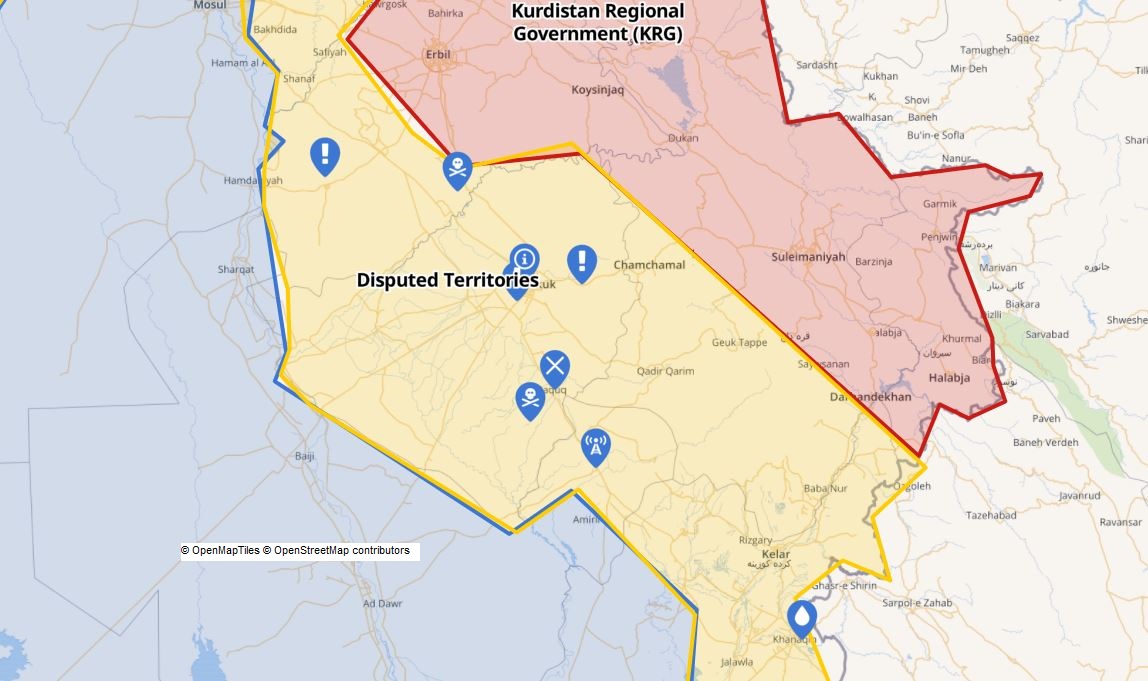1.1K
Kirkuk
- ISIS (Da’esh) terrorists resumed attacks in the “disputed territories” after relevant calmness. On January 7th, the terrorists launched eight Katyusha rockets on the Peshmerga posts near Pirde (Altun Kopri) district. According to the Ministry of the Peshmerga, no casualties were recorded. After the attack, Iraq’s security cell said, it confiscated the rocket launcher used. Meanwhile, Iranian-backed militias, the Popular Mobilization Units (PMU), denounced the terror attack for the first time. Further, on Monday, January 10, Da’esh terrorists kidnapped the head (Mokhtar) of the Delsi village south of the Daquq district after controlling the village for nearly two hours before a patrol of the Iraqi forces intervened.
- After days of reestablishing customs checkpoints between Kirkuk and the Kurdistan Region, the Iraqi government paused its operation after public outcry due to unfair treatment and bogus corruption cases against Kurdish businessmen. It remains unclear if the closure is permanent. The customs checkpoint was first set up in 2018 by former Iraqi Prime Minister Haider al Abadi, using it as an economic weapon against the Kurds. However, in 2019, the current Prime Minister Mustafa al Kadhimi annulled the decision before reactivating it two weeks ago. The checkpoints tax goods and local produce from the Kurdistan Region.
- The acting governor of Kirkuk, Rakan Saed al Jabouri, did not participate in the first session of the new Iraqi parliament despite winning a seat. According to local observers, al Jabouri aims to remain as acting governor of Kirkuk, a similar step he took in 2018. Iraqi laws allow lawmakers to take the parliamentary oath within a month of the first session, but in 2018, al Jabouri did not take the oath, and his seat remained reserved for him. The acting governor is backed by Sunni leaders, including the current Speaker, Mohammed al Halbousi.
- Kirkuk’s police announced the death of a “second largest” drug dealer in the province after he resisted arrest during a raid. The police did not release his name or further information. Since October 16, 2017, Kirkuk has become the main hub for drug trafficking, including by Iranian-backed militias.
- Continuing Arabization policies, the Daquq court changed its signs and removed the Kurdish language. The Kurdish language is recognized in Iraq’s constitution, but the local administration and the federal government aim to Arabize the “disputed territories.” Separately, in Daquq, owners of fish farms are worried after the ministry of agriculture ordered its department in the town to demolish all artesian wells. 2287 fish farms exist in Daquq and mainly use artisan wells as a source of water.
Khanaqin
- Due to drought, water in the Alwand River dam has decreased by 50% and continues to decline. Lack of rain during this winter, and Iranian water cutting off its source, has dramatically affected the dam.
Tuz Khurmatu
- On Tuesday, the Iraqi Interior Ministry announced the arrest of a senior Da’esh terrorist in charge of transporting militants in the region. The arrest took place in Tuz Khurmatu.
Makhmour
- Residents of Makhmour protested the Iraqi army’s blockade on the town. The blockade has prevented medicine and food deliveries from the Kurdistan Region. Locals called upon government officials and Kurdish leaders to intervene, threatening to expand the protests. Likewise, refugees in the Makhmour camp protested the Iraqi army’s new security measure. The Army now allows only one entrance into the camp and records all of the activity through surveillance cameras.
Shingal (Sinjar)
- In an interview with the state-owned al Iraqi, General Jabbar al Taie, Commander of West Nineveh Operations, said they will form a new force composed of Yazidis and that the Erbil-Baghdad security agreement has been activated since the beginning of 2022. Al Taie said; currently, only local police are in charge of Shingal as the military forces withdrew from it.
- In a press conference, Shingal mayor Mehma Khalil said 130 corpses Yazidi Genocide victims would return to the area next month after the completion of DNA tests in Baghdad. After years of genocide, mass graves are often found, consisting of victims massacred by Da’esh terrorists.

